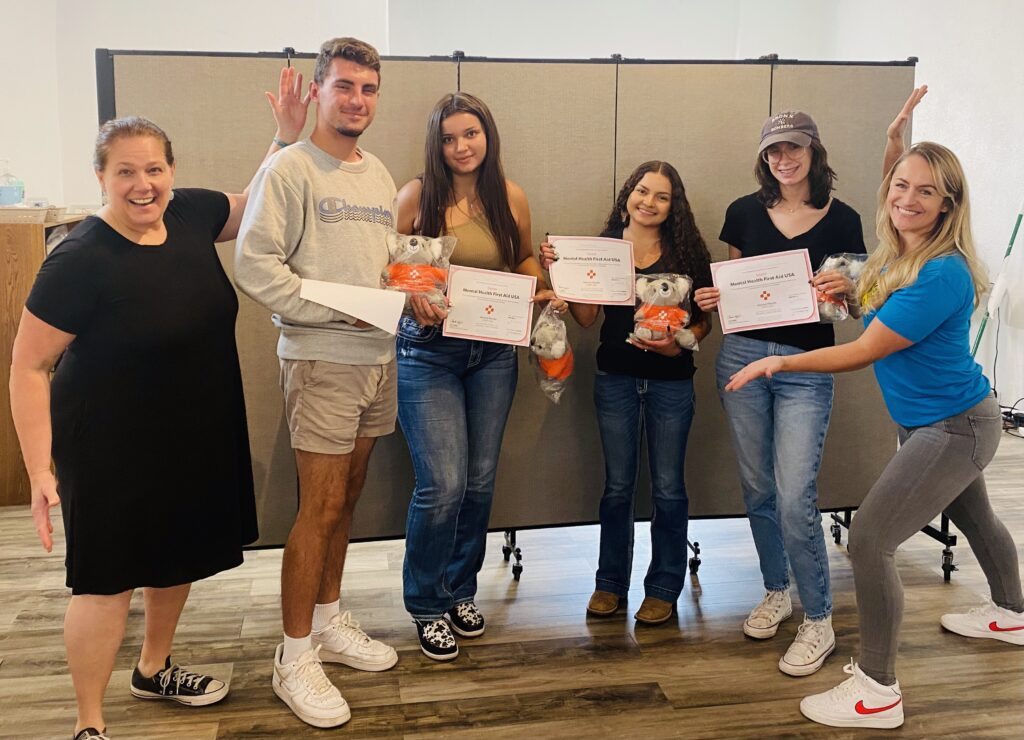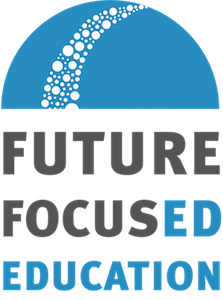Introducing Community Care Collective: Future Focused’s Youth Wellbeing Initiative

Jamila Toya (left) and Abby Garcia (right) walking through the halls of Jemez Valley High School.
Jamila Toya and Abby Garcia, students at Jemez Valley High School, walk into their school library to lead a mental health peer support group. They settle in at a round table surrounded by high ceilings and bookshelves, kicking off with icebreaker questions before diving into the day's focus.
“I wanted to become a mentor because I realized how many younger kids were struggling with mental health,” says Toya, a sophomore.
Toya and Garcia meet weekly with peers to lead discussions and activities centered on mental wellbeing. As teen leaders, they’re advocating for more mental health resources in their school and beyond. Both participated in a paid internship that equipped them with tools to become certified in Teen Mental Health First Aid and introduced them to the connection between social emotional learning (SEL) and positive youth development. Garcia, a freshman, even spoke on a panel at the 2025 New Mexico Parent Teacher Conference about social media and mental health.
Their leadership is part of a growing movement across New Mexico: youth are stepping up, breaking the stigma around mental health, and sparking change in their communities.
At the core of this movement is Future Focused Education’s new initiative: the Community Care Collective (the Collective). Its mission is to improve youth wellbeing in New Mexico through training, paid internships, mentorship, and peer support. The Collective envisions young people not just as beneficiaries of care, but as leaders and future behavioral health professionals strengthening their own communities.
“As a mom of five and a social worker of close to 20 years, I have seen first hand how critical it is for young people to feel seen, listened to, understood, and reminded that they aren’t alone” says Ali Sillas, the Collective’s director. Sillas emphasizes students' need for, “a sense of belonging, purpose, agency, and a connection to themselves and their community.”
Future Focused Education has long supported student wellbeing, and the Community Care Collective is an expansion of that ongoing work. The initiative brings together students, staff, families, and community partners to build trust, draw on cultural strengths, and empower youth leadership in mental health. These elements are integrated into other efforts in school transformation that Future Focused is part of across the state, such as capstones, graduate profiles, and work-based learning. For example, Teen Mental Health First Aid is part of the capstone experience at schools like Del Norte High School and Gordon Bernell in Albuquerque.
“We’re creating a whole-school approach to mental health and wellbeing,” says Sillas. “When staff are trained to recognize and respond to mental health challenges, it helps foster a more responsive, stigma-free environment for students.”
Through the Collective, participants gain a deeper understanding of mental health, including the signs and experiences of mental health challenges, and factors that can promote well-being. They also learn how to connect peers to professional, community, and culturally relevant resources, building confidence and readiness to offer support when needed.

A student in the peer support group with Toya and Garcia.
The Context: Youth Mental Health in New Mexico
New Mexico faces an ongoing shortage of mental health providers – meeting less than 20% of the state's current mental health care needs. This shortage is exacerbated in rural areas, which often face severe shortages of mental health professionals.
Factors such as stigma, mistrust of healthcare systems, and socioeconomic challenges can create additional barriers to accessing care, especially when it is most needed. Many rural areas in New Mexico, including tribal lands and communities, often face a shortage of culturally and linguistically appropriate resources that reflect the unique needs and values of these communities.
Youth like Toya and Garcia also highlight the lack of social outlets as a contributing factor to mental health struggles. Toya finds solace in playing guitar, while Garcia finds joy and support in volleyball, alongside other activities that help them stay connected. However, not all young people have access to healthy outlets or caring relationships. Peer support, mentorship, and physical and creative expression are essential alternatives that can provide these critical healthy connections.
“Personally, my family has struggled with mental health and addiction, rooted in trauma that we didn’t yet understand,” Sillas shares. “Now we know more about trauma and want to carry the wisdom and resilience of those who came before us — and we can use that to support our young people.”
While data from the New Mexico Youth Risk and Resiliency Survey (NM-YRRS) shows some improvements since 2021, the state still ranks 45th in youth mental health, according to Mental Health America. But young leaders like Garcia and Toya are living proof that youth-driven mental health programs make a real difference.
Sillas hopes the Collective can become a model for other rural communities — a network of trained youth and adults working together to care for one another. "By investing in their development, ongoing support and trusting their leadership, young people can become the behavioral health professionals their communities urgently need," she says.

Toya playing the bass guitar in the music room.
How it works
The strength of the Community Care Collective approach lies in its ability to address two critical needs at once. It offers New Mexican youth valuable professional development opportunities while also expanding mental health support, resources, and opportunities for young people. Most importantly, programs like this help remove barriers for youth interested in behavioral health careers by providing paid internships, training, career exploration, and a pathway to higher education and professional certifications like Youth Peer Support, Community Health Worker, etc. This approach helps fill the immediate and future need for behavioral health providers while ensuring young people have the mentorship and support they need to succeed in the field. The Collective is perfectly poised to address the call for regional plans and behavioral health workforce pathways outlined in New Mexico’s recent Senate Bill 3 (SB3), the Behavioral Health reform and investment Act.
The Community Care Collective is guided by a statewide advisory group, including behavioral health professionals, higher education leaders, state government, school partners, and Behavioral Health Career Pathway interns. This group ensures that youth and communities co-design the conditions for success while incorporating cultural and geographic contexts to meet the needs of diverse communities. The advisory group also sets the policy and advocacy agenda, in partnership with the Instituto del Puente, to promote the growth of these opportunities across the state.
The Collective has formalized partnerships with Central Region Educational Cooperative schools and districts, while also leveraging Department of Health-Behavioral Health funding and the Department of Labor’s Foundation’s of Growing Our Own, to engage schools across the state in:
- Training students as Teen Mental Health First Aiders to increase mental health literacy, student-driven action (e.g. clubs, wellness rooms, campaigns) and positive peer support.
- Training school administrators, educators, support staff, parents, and community members in Youth Mental Health First Aid to improve their awareness and responsiveness to youth mental health needs and challenges.
- Engaging youth in paid internships for those interested in pursuing careers in behavioral health professions, while earning stackable professional credentials and certifications.
Learn more about the specific trainings and pathways that Community Care Collective offers below.

Garcia and Sillas.
What the collective offers
Community Care Collective Trainings:
- Youth and Teen Mental Health First Aid is evidence-based, nationally recognized training designed to teach your community how to identify, understand, and respond to signs of mental health challenges.
- Nurtured Heart Approach® Training is a relationship-based approach to the way we interact with youth. Shifting focus away from negativity to recognizing and amplifying strengths fosters resilience, self-regulation, and confidence for all ages.
- Customized Professional Development can include: trauma-responsive practices, Social Emotional Learning (SEL), and custom training for youth mental health and youth-led initiatives.
Community Care Collective Career Pathways:
- Youth Mental Health Group Internships provide training and certification in Teen Mental Health First Aid, and help youth develop vital skills to support peer mental health. Interns have opportunities to collaborate on statewide programs, services, and policy related to mental health and wellbeing, while exploring behavioral health careers.
- Behavioral Health and Human Services Career Pathways offer paid internships in Behavioral Health fields. In partnership with New Mexico higher education institutions and behavioral health employers, young people can gain essential skills, and prepare for college and the behavioral health workforce.

A group of students showcasing their Teen Mental Health First Aid Certificates.
To find out more or get involved with Community Care Collective, contact Ali Sillas: [email protected]


